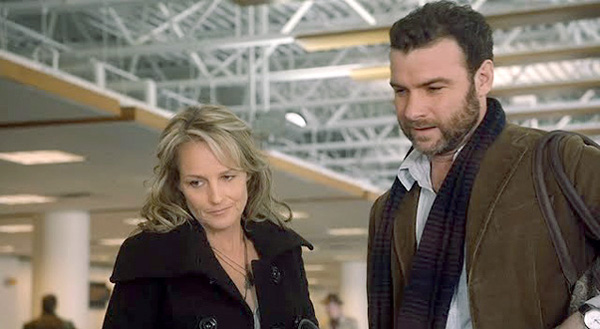|
Reviews of Recent Independent, Foreign, & Documentary Films in Theaters and DVD/Home Video

EVERY DAY If this film doesn’t read as boring from its title alone, feel free to try me. However, I’m convinced this is a more conceptual film than it will be credited for, one in which audiences are made to feel as dispirited as its main character as he attempts to weather a wife-and-kids-and-picket-fence lifestyle. Liev Schreiber plays such a schlub—aptly named Ned—unhappy with his job and his life. The title sequence finds him cooking breakfast for his 12- and 16-year-old sons, clearly announcing just how mundane this story will be. Helen Hunt plays the pitiable wife whose bitter, wheelchair-bound father Ernie (Brian Dennehy) comes to live out his final days with the family. Schreiber and Hunt play it straight and, frankly, uninspired, while Dennehy is about as large a personality as one could tolerate in this modest movie. Is his loud, selfish grump over the top? Possibly, but if nothing else, Dennehy at least reminds us of the memorable roles he’s played before, while Hunt and Schreiber instead feel about as bored as we do. The real standout is Ezra Miller as Jonah, the 16-year-old son whose open homosexuality is another mild source of family friction. The sharp and charismatic Miller will probably be a household name any day now, and here he gives us one of the few reasons to sit through the drudgery. Ned’s crisis of morals arrive when he has the opportunity to screw a co-worker in her private pool below her inviting Manhattan high-rise. His wife, meanwhile, attends their kid’s violin recital and cares for her ailing father. As an audience member, I feel like I’ve been suckered in here after the first half of the film sets Ned up as a victim of the establishment—a guy who’s unfairly saddled with the pressures of maintaining a “normal” life. Instead, he’s really just a selfish prick, whining about the unfairness of his job (a well-paid one as a TV writer, mind you) and sleeping around behind his family’s back without even bothering to think up a good alibi as to why he comes home smelling like chlorine. Ned’s discrepancies seem to wash away during the climax, focusing now on Ernie’s impending death and emotional redemption with his daughter. Jonah’s sexuality, Ned’s infidelity—none of it seems important in the face of a family member’s mortality. I’ll buy that, but as a climax for this film? I think not. Something feels way too easily wrapped up. Deep-seated marital problems aren’t going to be solved by Ernie’s potential passing, and Jonah’s growth process is far from over. Ernie’s death feels too much like a convenience. I refuse to believe our everyday lives—even
conventional, uninspired ones—are as uninteresting as this.
Michael Lee
|

